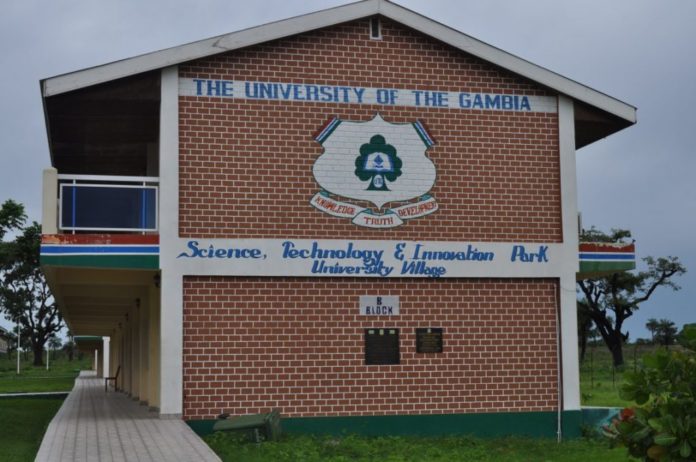The hue and cry over the advertisement regarding the position of UTG Vice Chancellor has reached its crescendo. It is quite baffling that a simple and straight forward matter like this is threatening to tear the university apart. The Governing Council has reviewed and evaluated all the allegations put forward by the Staff Association and wishes to clarify as follows: .
1. That the Governing Council and its Joint Search Committee have violated no section of the 1999 Act which established the University of The Gambia, or the Conditions of Service for Senior Staff of the UTG, 2007.
2. The first issue raised by the UTGFSA was regarding Section 4.3.5 of the Conditions of Service which states that we should advertise the position of Vice Chancellor “one year before the expiration of the tenure of the incumbent.” This rule could not be appropriately followed because the incumbent Vice Chancellor’s contract, which was reviewed in March 2021, was not renewed beyond September 2021. To apply that rule would mean that we would hold the position of Vice Chancellor in an acting capacity for at least six months after the departure of the incumbent. That would be a most undesirable scenario. So at the Governing Council Meeting which agreed not to extend the incumbent’s contract, Council decided that the position be advertised in time for a new Vice Chancellor to assume duty on October 1, 2021. In taking this decision, Council relied on Chapter 2; Section 2.2: Interpretation and Amendments, of the Conditions of Service, 2007:
“The Council has the power to amend, relax, change or delete any rules or regulations, which it deems not to be in the best interest of the University.”
A noteworthy point here is that in setting aside the one-year advertisement rule, the Council did not violate the Conditions of Service of any member of staff.
It should also be pertinent to say that in exercising the same power vested in it to amend any aspect of the Conditions of Service, the Council in 2020, changed the policy since 1999 of appointing staff on three-yearly contracts( Section 4.2.2) and introduced permanent appointment of staff with effect from January 2021. We suppose one should not expect the Staff Association which demanded the change to cry foul.
3. Butfor better clarity, itis important to consider the one-year period for the advertisement in its historical context. In 1999 and going into the first decade of the life of the University, advertising high profile academic positions was done through the print media locally, which had limited and slow circulation, or in international educational journals whose reach was wider but still slow. So one needed a long period of exposure to reach potential applicants and attract responses. Today, technology has made it possible to reach the entire academic world within a few days, through websites, social media platforms, and online journals. So much so that we advertise no position in the world today for one year, not even the position of Secretary General of the United Nations. Our current advertisement for the position of Vice Chancellor of the University of The Gambia has reached the entire English-speaking academic world and Commonwealth. We have reached more people in a much shorter period; that is progress.
3. The second complaint of the UTGFSA is that the Registrar of the University should not be part of the Joint Search Committee because he is not listed as a member in Section 4(2) (a) (b) (c) of the Bye-laws. Including the Registrar is lawful under Section 8:
“(6) The Council may establish Committees of Council and may co-opt a person who is not a member of Council to any Committee for such term as may be prescribed”
The Registrar is co-opted as Secretary to the Joint Search Committee because he is the most experienced person within the University regarding the Committee’s assignment of facilitating the recruitment of a Vice Chancellor. The Registrar is the Secretary to both the Governing Council and Senate (1999 Act Sections 8(2) & 9(6)). These are the two highest and most sensitive committees of the University. It would therefore be only natural and appropriate for him to be Secretary to a joint committee of Council and Senate. In fact, the inclusion of this as a complaint is quite baffling. This is because the same Section 4.3.5, part of which the UTGFSA quoted in their letter regarding the one-year advertisement, continued in the next paragraph to allow the involvement of the Registrar in the appointment process of a new Vice Chancellor, by stating:
“After the closing date, the University Registrar shall on the advice of the Vice Chancellor, prepare a short-list of applicants qualified in terms of the advertisement.”
The Governing Council gets the impression that the UTGFSA ignored that paragraph of the Conditions of Service because it did not suit their purposes. But what part of the process is more sensitive than the short-listing of applicants? Yet the same Conditions of Service say that the Registrar shall do the short-listing of applicants. However, to improve on the transparency of the process, the Joint Search Committee will do the short-listing at committee level, rather than leaving it with the Registrar alone to do. Is this then a violation of the Law?
The governance laws, rules, regulations and guidelines of the University or any other institution are a homogeneous and organic whole. Cherry-picking isolated quotes without cross-reference with complementing sections is recipe for confusion and can be interpreted as a sinister ploy at misinformation.
The third issue or complaint was why the decision to direct all interested persons to send their applications to the Chairman of Council and the Registrar as Secretary. The Committee’s decision was taken on a majority voice of six to one. The four members of Council and two members of Senate spoke against any other method of receiving applications than through the Chairman and the Secretary. They trusted that the two persons involved would safeguard the integrity of the process.
Subsequently, as indicated by UTGFSA, Dr. Gibba resigned from the Joint Search Committee for the same three facile reasons that are now being wielded as weapons for a Staff industrial action. For reasons best known to him, but which are now obviously unwholesome, he went public with a newspaper publication, a preemptive move for possible disruptive action; thankfully, the average Gambian reader is now quite discerning.
UTGFSA embark on industrial action based on misinformation, unfounded claims, distrust, suspicion and conspiracy theories? For what gain and whose interest? No member of the Council depends on their membership for a livelihood and Staff on strike action receive their salaries at the end of the month. But the helpless student, who is still trying to catch-up after the disruptive effects of the COVID-19 slowdown, is abandoned. That would be a damning indictment on the leadership of the UTG Faculty & Staff Association.
The Staff Association should learn to respect the legally prescribed separation of Responsibilities in the UTG. The responsibility for Governance lies on the shoulders of the Council supported by the Vice Chancellor and his Management Team. Academic staff are to perform the principal function of the University – to teach, guide and undertake research work. The Administrative staff are to support and facilitate the operations of the University. Then there are the students for whose reason the University exists and whose interest should be paramount in the entire scheme of things. In promoting and protecting the interests of their members, Student and Staff Associations cannot take over the functions of the Council and Management; that is an aberration that cannot be condoned.
The Governing Council would urge that UTGFSA weigh its options carefully and avoid any action that would create the impression that the UTG is an unstable and acrimonious community. The current popular view the UTG is an island of tranquility in a turbulent University environment in our sub region was not easily earned but can be completely lost with one thoughtless action. Tarnishing the image of the University and by extension the country would be a terrible legacy for UTGFSA executive, a less than patriotic achievement.



















